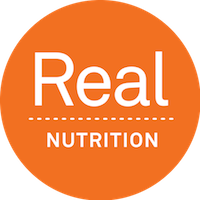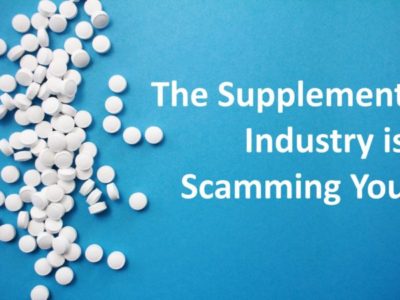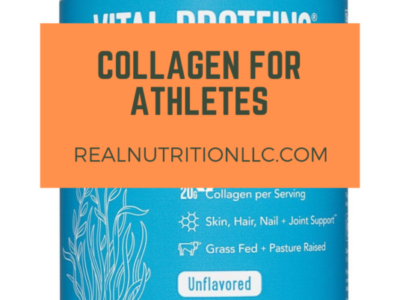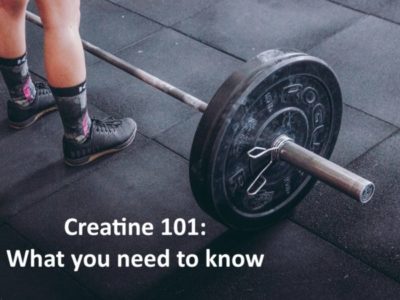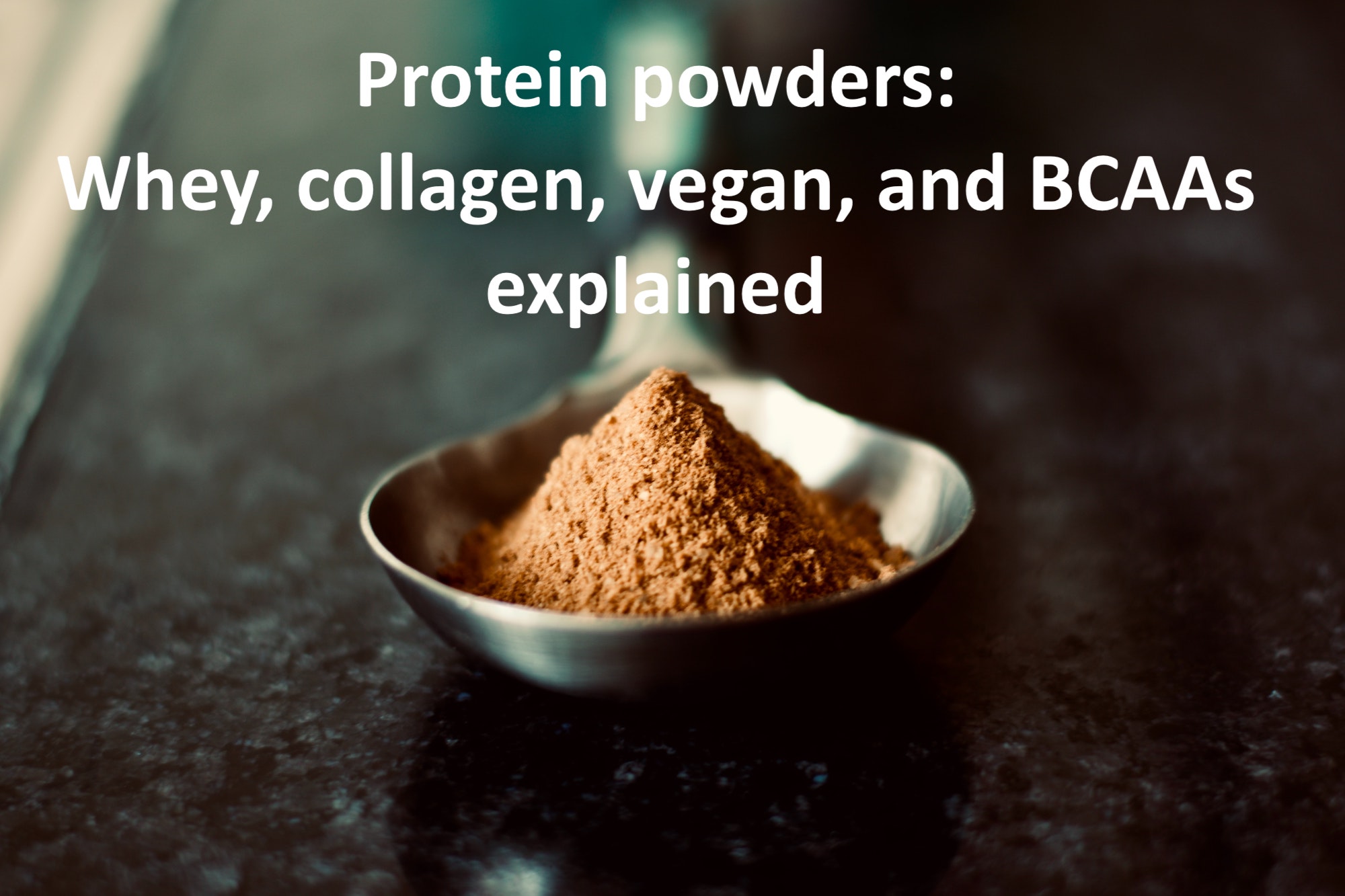
Protein powders can be confusing! There are so many on the market, and so many messages we hear about them. Which one is right for you? Or do you need a different one in different situations? Whey, collagen, vegan powders, and BCAAs all have specific uses. Read on to figure it all out!
Why do you need a protein powder?
Well, you may not need one at all! Food first is a good philosophy. But sometimes a protein powder can be useful. If you are really busy and can’t find the time to eat a full meal, protein shakes are a good option as long as you can pair it with some food. Some people like the convenience of protein powders. And they can also be useful to help you meet your overall protein needs, especially if they are high (such as during a strength training phase, weight loss phase when trying to preserve lean mass, or you have an injury that requires more protein to heal).
What are some drawbacks of protein powders?
Many are contaminated with fillers, heavy metals, banned substances, and other undesirable products. Be sure to check for the NSF for Sport or Informed Choice logo on the label. This means it has been third-party tested for purity. Many vegan powders have more contaminants than whey.
Another drawback is that you are not eating a whole food. When you eat food, it contains vitamins, minerals, fiber, phytonutrients, antioxidants, and other healthful compounds (depending on the food, of course!). When you eat a highly processed powder like a vegan protein powder, you are missing out on all the wonderful things the more whole plant could have provided you.
Whey is the gold standard for protein powder
If you’re looking for muscle growth, strength, rebuilding, repair, and recovery, whey is the way to go. It is a complete protein source, meaning it has all the amino acids. This is important, as muscles need a full complement of amino acids in order to grow and repair. It also is high in leucine, which is a particularly useful amino acid involved with signaling muscle protein synthesis. Numerous studies comparing whey to plant proteins show that whey is superior for muscles.
For best results, consume quality whole food protein (egg, cottage cheese, milk, salmon, chicken, or beef) within about 2 hours after working out at around 20-30 grams for your meal. If you need to use a protein powder, use whey (2 scoops is usually around 20 grams for most brands).
You’ll also need adequate calories for muscle growth–so be sure to eat enough!
Collagen is used for tendon and ligament strength and repair
Collagen is another useful protein powder. It serves a totally different purpose than whey. It has been shown to strengthen tendons and ligaments when taken about 30 minutes BEFORE a workout, along with some vitamin C. The collagen and vitamin C work together to strengthen the tendon and ligament when they are under an exercise load, or under stress when you work out. This can also be used if you have a soft tissue injury.
To use, take collagen before your workout or physical therapy session–about 20 grams combined with 50 mg vitamin C. Read more on collagen in our other post.
Collagen is very different from whey and has a different application. It also doesn’t have a good source of all amino acids, including leucine, so bear that in mind. If you’re looking for muscle building and support, use whey (or food!). If you want tendon/ligament support, use collagen. Don’t think that by taking collagen you are necessarily going to support muscles. Although it’s not useless for this, it just different.
Also collagen is strictly a non-vegan product, but there is potential for vegan collagen to be grown in the lab for widespread consumer use.
Vegan protein powders
Honestly the only reason I can think of to use a vegan protein powder is if you’re vegan. For any kind of muscle or soft tissue strengthening/building, whey is better than soy, hemp, pea, rice, or a blend. “Plant-based” is all the rage right now, and if you’re aiming for a plant based diet that’s great. But that doesn’t mean you need to use an inferior protein powder. If you’re not vegan, use whey. You can still be plant-based while using whey!
Vegan powders have the drawback of more risk for contamination, an incomplete amino acid profile (except soy and some blends), and a low source of leucine. They sometimes also have added fiber and carbohydrate, which is silly if you’re buying a protein powder for the protein.
If you want to use vegan protein powder as an on-the-go meal replacement, go for it. But if you’re using it thinking that it will help with muscle repair and building, trade it out for whey.
What are BCAAs used for?
BCAAs are used to put money in the pockets of supplement companies.
Ok, I kid, but only sort of. They are not actually good for much. While it is true that BCAAs (branched-chain amino acids) are important for muscle building and repair (leucine is a BCAA), it’s not generally true that you need to supplement with them separately.
Here’s why:
BCAAs are readily found in foods people normally eat, and in the dose you would need to build and repair muscle. Things like chicken, beef, salmon, eggs, and milk all are rich sources.
BCAAs are also already in whey, so if you’re using a protein powder, use whey, not BCAAs (and definitely not both).
BCAAs are not a complete protein. BCAAs, and leucine in particular, are needed for muscle protein synthesis. But that’s not the whole story. More research is showing that muscles like a full amino acid profile on board. If you are eating just BCAAs without other amino acids, you’re missing out! (Although if you eat a balanced diet, you’d be fine–but then why do you need BCAAs?).
The only reason someone may need BCAAs is if you are vegan and it’s difficult to get adequate leucine in your diet. Other than that, ditch the (gross) and expensive BCAAs and opt for a clean whey powder that is third-party tested.
For a handy chart listing all sorts of protein powders, read our other post on how to pick a protein powder.
Want to know more? Check out our on-demand course, Ultimate Guide to Useful Sports Supplements.
~This is general information only and is not intended as medical advice. Always consult your healthcare provider before undergoing any diet or lifestyle change.
Check out our amazing nutrition resources, including on-demand courses, free downloads, and webinar replays.
- Nutrition for Climbers
- The Ultimate Guide to Useful Sports Supplements
- Ditch Diets and Become an Intuitive Eater
And be sure to follow us on Instagram!
Book an appointment with the dietitian
Selected References
VAN, V. S; BURD, N.A; VAN LONN, L. J. The Skeletal Muscle Anabolic Response to Plantversus
Animal-Based Protein Consumption. J Nutr, [s.l.], v. 145, n. 9, p. 1981‐1991. 2015.
doi:10.3945/jn.114.204305
BABAULT, Nicolas et al. Pea proteins oral supplementation promotes muscle thickness gains
during resistance training: a double-blind, randomized, placebo-controlled clinical trial vs.
whey protein. Journal Of The International Society Of Sports Nutrition, [s.l.], v. 12, n. 1, p. 3-
8, 2015. http://dx.doi.org/10.1186/s12970-014-0064-5.
BOUTROS, Guy Hajj et al. Is a vegan diet detrimental to endurance and muscle strength?
European Journal Of Clinical Nutrition, [s.l.], p. 50-59, 24 abr. 2020. Springer Science and
Business Media LLC. http://dx.doi.org/10.1038/s41430-020-0639-y.
KJAER, Michael, et al. From mechanical loading to collagen synthesis, structural changes and
function in human tendon. Scandinavian journal of medicine & science in sports, 2009,v.
19, n. 4, p. 500-510, 2009. https://doi.org/10.1111/j.1600-0838.2009.00986.x
HOLM, L. et al. The effect of protein and carbohydrate supplementation on strength training
outcome of rehabilitation in ACL patients. Journal Of Orthopaedic Research, [s.l.], v. 24, n.
11, p. 2114-2123, 17 ago. 2006. http://dx.doi.org/10.1002/jor.20147.
Shaw G, Lee-Barthel A, Ross MLR, Wang B, Baar K. (2017). Vitamin C-enriched gelatin supplementation before intermittent activity augments collagen synthesis. American Journal of Clinical Nutrition, 105:136-43
Clark KL, Sebastianelli W, Flechsenhar KR, Aukermann DF, Meza F, Millard RL, Deitch JR, Sherbondy PS, Albert A. (2008). 24-week study on the use of collagen hydrolysate as a dietary supplement in athletes with activity-related joint pain. Current Medical Research and Opinion, 24:5, 1485-1496
Gorissen SHM, Witard OC. (2017). Characterising the muscle anabolic potential of dairy, meat, and plant-based protein sources in older adults. Proceedings of the Nutrition Society, p. 1-12
Hulmi JJ, Lockwood CM, Stout JR. (2010). Effect of protein/essential amino acids and resistance training on skeletal muscle hypertrophy: A case for whey protein. Nutrition & Metabolism, 7:51
